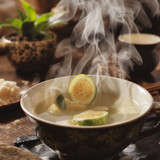

Starwest Botanicals
Organic White Tea Bags
White Tea Bags vs. Green Tea: Why They’re Different White tea and green tea come from the same plant—Camellia sinensis—but they’re made differently. That difference in processing is why white tea...
Yan Hu Suo (Corydalis yanhusuo) is a traditional Chinese herb used to support healthy circulation and ease occasional discomfort. It’s commonly included in formulas for emotional stress and muscle tension.
Some herbs are gentle. Yan Hu Suo is not one of them. This powerful rhizome, sometimes called the “natural morphine of Chinese medicine,” has been used for centuries to promote healthy blood flow and relieve occasional pain—without the fog of pharmaceuticals. Whether you’re dealing with muscle tension, menstrual cramps, or emotional knots, Yan Hu Suo offers a time-tested solution rooted in Traditional Chinese Medicine.
Quick Summary Of Yan Hu Suo - Cordydalis Rhizome
| Property | Details |
|---|---|
| Pin Yin Name | Yan Hu Suo (延胡索) |
| Botanical Name | Corydalis yanhusuo |
| English Name | Corydalis Rhizome |
| TCM Category | Invigorate the Blood |
| Taste & Properties | Acrid, Bitter, Warm |
| Meridians Entered | Heart, Liver, Stomach |
| Part Used | Rhizome |
| Recommended Forms | Decoction, Powder, Capsule, Extract |
Yan Hu Suo excels at moving Qi and blood, which makes it one of the top herbs in TCM for issues associated with stagnation.
In TCM, it is used to:
Invigorate blood and move Qi
Alleviate discomfort from trauma, menstruation, or stress
Calm emotional unrest caused by stuck energy
Harmonize the middle jiao and relieve constraint
Common pairings:
Chuan Xiong: For blood stasis and menstrual issues
Xiang Fu: For emotional and Liver Qi stagnation
Dang Gui: For blood nourishment alongside Qi movement

How to Use Yan Hu Suo
| Form | Use & Dosage |
| Decoction | 3–10g simmered for 30 minutes; combine with Qi-moving herbs |
| Powder | 1–2g up to 3x daily; best taken between meals |
| Capsule | 500–1000mg per capsule; follow professional guidance |
| Tincture | 30–60 drops in water, up to 3x daily |
Consult a healthcare professional before combining with sedatives or anticoagulants.
Recipe: Emotional Flow Tea Great for:
Tension headaches, irritability, PMS, emotional stagnation
Ingredients:
6g Yan Hu Suo
5g Xiang Fu (Cyperus Rhizome)
4g Bai Shao (White Peony Root)
3g Gan Cao (Licorice Root)
Instructions: Simmer all herbs in 3.5 cups of water for 30 minutes. Drink 1 cup twice daily.
Herb Comparison Of Herbs Similar To Yan Hu Suo
| Herb | Primary Function | Temp. | Notes |
| Yan Hu Suo | Moves Qi & blood, eases pain | Warm | Good for tension and blood stasis |
| Chuan Xiong | Moves blood & dispels wind | Warm | Headaches, gynecological use |
| Xiang Fu | Moves liver Qi, emotional use | Neutral | Pairs well with Yan Hu Suo for PMS tension |
| Bai Shao | Nourishes blood, softens Liver | Slightly Cold | Balances moving herbs and calms spasms |
FAQs Q: Is Yan Hu Suo safe for long-term use?
A: Traditionally used short-term or intermittently. Consult a practitioner if using beyond 2 weeks.
Q: Can it be combined with medications?
A: May interact with sedatives or blood thinners. Always consult your healthcare provider.
Q: Is it habit-forming?
A: No, but it’s best used as needed rather than daily long-term.
Q: Does it cause drowsiness?
A: It may have calming properties, especially in larger doses.
Q: Is Yan Hu Suo good for pain?
A: Traditionally, it is used to support blood flow and relieve Qi stagnation, which may contribute to comfort in TCM theory. It is not a painkiller but can be part of a natural approach to support discomfort relief.

Yan Hu Suo isn’t just another herb—it’s one of Traditional Chinese Medicine’s most trusted allies for easing discomfort and emotional tension without sedation or habit-forming effects. Its unique ability to move Qi and invigorate blood makes it a favorite for those experiencing occasional aches, menstrual imbalance, or emotional stress related to stagnation.
Whether used on its own or as part of a balanced formula, Yan Hu Suo offers a natural, well-rounded approach to comfort, clarity, and inner flow. If you're looking for herbal support that works gently yet effectively—this is the root to reach for.
References
Scientific Research Overview Note: These studies do not suggest disease treatment or prevention. For informational purposes only.
Pain-Modulating Effects
Study: Corydalis extract reduces pain sensitivity via dopamine receptor pathways
Link: PubMed
Neuroprotective Properties
Study: Corydalis alkaloids show anti-inflammatory and neuroprotective effects
Link: PubMed
Sedative and Calming Actions
Study: Extract demonstrates anxiolytic-like effects in animal models
Link: PubMed
Circulatory Support
Study: Corydalis promotes vasodilation and improves microcirculation
Link: PubMed
Digestive Discomfort
Study: Used to manage stomach pain and discomfort due to Qi stagnation
Link: PubMed
Corydalis alkaloids support neurotransmitter regulation and emotional balance — PMID: 27890971
Tetrahydropalmatine (from Corydalis) shows calming effects in stress-induced models — PMID: 30195401
Supports healthy blood flow and nervous system modulation — PMID: 31904245